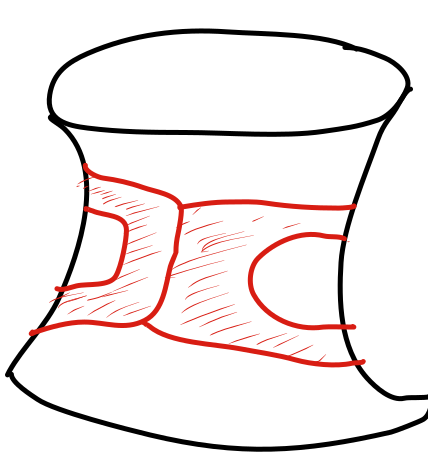Let $(M, \mu, d)$ be a geodesically complete non-compact Riemannian manifold such that measure $\mu$ is volume doubling, i.e. \begin{equation}\label{VD}\mu(B(x, 2r))\leq C\mu(B(x, r))\end{equation} for some constant $C>0$ and also $M$ satisfying the $L^{2}$-Poincare inequality $$\frac{1}{\mu(B(x, r))}\int_{B(x, r)}{|u-u_{B(x, r)}|^{2}d\mu}\leq cr^{2}\frac{1}{\mu(B(x, \delta r))}\int_{B(x, \delta r)}{|\nabla u|^{2}d\mu}$$ for all $u\in W^{1, 2}(B(x, r))$ with $\delta>1$ and $\nabla u$ being the weak gradient of $u$.
For a fixed point $x_{0}\in M$ and $\alpha, \beta\in \mathbb{R}_{+}$ consider the annuli $$P_{\alpha, \beta}=\{x\in M:\alpha<d(x, x_{0})<\beta\}.$$
Question: Is there a statement known, such that under these assumptions (or even stronger), any function $u\in L_{loc}^{2}(P_{\alpha, \beta})$ with $$\int_{P_{\alpha, \beta}}{|\nabla u|^{2}d\mu}<\infty$$ can be extended to a function $\widetilde{u}\in L_{loc}^{2}(M)$ such that $$(*)\int_{M}{|\nabla \widetilde{u}|^{2}d\mu}\leq C\int_{P_{\alpha, \beta}}{|\nabla u|^{2}d\mu}?$$
The closest statement I found is from "On extensions of Sobolev functions defined on regular subsets of metric measure spaces" by P. Shvartsman. In this paper he proofs that considering a regular set $S$, i.e. a set such that there are constants $\theta_{S}\geq 1$ and $\delta_{S}>0$ such that for every $x\in S$ and $0<r\leq\delta_{S}$ $$\mu(B(x, r))\leq \theta_{S}\mu(B(x, r)\cap S),$$ then any function $u\in L^{2}(S)$ such that $u_{1, S}^{\#}\in L^{2}(S)$ where $$u_{1, S}^{\#}(x):=\sup_{r>0}\frac{r^{-1}}{\mu(B(x, r))}\int_{B(x, r)\cap S}{|u-u_{B(x, r)\cap S}|d\mu}$$ can be extended to a function $\widetilde{u}\in CW^{1, 2}(M)$ such that $$\|\widetilde{u}\|_{CW^{1, 2}(M)}\leq C(\|u\|_{L^{2}(S)}+\|u_{1, S}^{\#}\|_{L^{2}(S)}),$$ where $CW^{1, 2}(M)$ is the Calderon-Sobolev space which coincides with the classical Sobolev space $W^{1, 2}(M)$ if one assumes volume doubling and $M$ satisfying the $L^{2}$-Poincare inequality.
Thanks in advance for your help!

